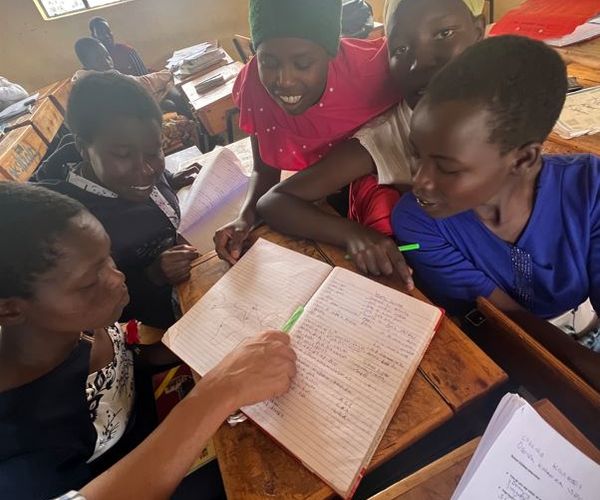BU chapter of Engineers Without Borders brings clean water to Kenyan community
By Patrick L. Kennedy
If you had to choose between water and school, you would probably pick the water. Not long ago, that was the calculus for many children in rural Tinet, Kenya. The Ogiek people who populate the dirt-road region had to walk up to eight miles to and from a shallow stream to fill large buckets with dirty water. This job typically fell to women and children, meaning kids skipped school out of necessity.
Enter the Societal Engineer
Community members sought help from Engineers Without Borders (EWB), and the nonprofit’s Boston University chapter answered the call. EWB matches student and professional engineers with under-resourced communities around the world. Volunteers travel to remote villages, listen to residents to find out what they need, and leverage their training and expertise to meet those needs with engineering solutions.

In 2020, EWB-BU installed a borehole well and water distribution system in Tinet. That was just the beginning of an ongoing effort. Successive groups of BU students have since returned to Tinet and expanded the program, building a rainwater catchment system at a primary school. They’ve tested soil and water conditions and trained residents to monitor and maintain the system. Year round, the chapter stays in touch with the community and keeps tabs on the project. The students raise funds in Boston, and coordinate from afar with contractors in Kenya, using those donor dollars to bring surveyors and technicians to Tinet from the nearest towns, hours away.
Trip to Tinet
The latest team of students on the case includes chapter president Vittoria Sama (ENG’25), a biomedical engineering major; fellow board member Clara Armon (ENG’27), also a BME major; and Omar Elhussini (ENG’27), a mechanical engineering major. The trio traveled to Tinet in August with Professor James Galagan (BME, ECE).
There, they checked up on the rainwater system at the primary school, testing the water for bacteria and inspecting the pipes for cracks. (All was well.) Then they started work on a new borehole well project at another school in the area.
“Our primary focus is to provide water to students so that they’re able to continue their education,” says Sama.
Education matters to the Ogiek people a great deal, the BU students learned. “We couldn’t believe the number of parents and community members that showed up to meet us, considering it was a school break,” Sama says. “They were very focused on this and very committed.”
Driven out, driven to succeed

The Ogiek are a traditional hunter-gatherer community indigenous to the Mau Forest. But in recent years, the Kenyan government has been evicting thousands of Ogiek from the forest. Many Ogiek now in the neighboring Tinet region have taken up agriculture, especially raising goats and cows.
“They’re very driven,” says Sama. “Some of the kids said they were interested in engineering. Their main goal is to get out, get a higher education, and help their families.”
Those face-to-face conversations are key to the multi-year partnerships that EWB facilitates, the goal being to empower people by collaborating with them. “We talked to as many people as we could in the community,” says Sama. “We did a bunch of surveys, making sure that we’re meeting their needs while we’re building the borehole well.”
“It was a great experience,” Sama adds. “It’s nice to get to know who you’re helping and to empathize and have a connection with them. Everyone was really welcoming and super nice.”
Seeking donations
This semester, EWB-BU is raising funds to get the new borehole well installed before the chapter’s next trip to Tinet. Efforts include selling copies of a children’s book about clean water accessibility. Written and illustrated by Armon and other EWB-BU members, the book follows a lion and other animal characters as they collaborate on a solution to water contamination. Visit https://ewbbu.org/donations to learn more.

